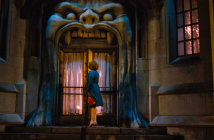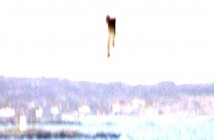
2001: A Space Odyssey (1968)
Cast: Keir Dullea, Gary Lockwood, William Sylvester
Directors: Stanley Kubrick
Country: USA | UK
Genre: Mystery | Sci-Fi
Editor’s Notes: The following review is part of our coverage for TIFF’s Stanley Kubrick: A Cinematic Odyssey. For more information on upcoming TIFF film series visit http://tiff.net and follow TIFF on Twitter at @TIFF_NET.
It had been a grueling week, one that was only getting to get worse. My grandfather, the strongest man I know, had passed away six days ago and his funeral was two days away. I had been blessed with the honor of not only writing his newspaper obituary but also delivering his eulogy following his military funeral. My heart, soul and everything in me had been subjected to to so many emotions. I need a break from it all, so I did what I do best: watch a movie. Walking into a 70mm showing of Stanley Kubrick’s 2001: A Space Odyssey didn’t completely eliminate my grief; I certainly wouldn’t want that. What it did do was provide a forum that would instill in me a sense of calm and ultimately prove to be a life affirming experience.
From the dawn of man sequence to the return of the space baby to planet earth, the technology on display is unparalleled and hasn’t aged at all.
Proving once again they are the best theater chain around, the Alamo Drafthouse projected an original 1969 70mm print of 2001: A Space Odyssey to a sold out audience, complete with a prelude, intermission, and exit music. By the time the opening notes of Strauss’s “Also Sprach Zarathustra” had reached their triumphant and epic climax, I was completely enthralled, tears streaming down my face from the sheer beauty and magnitude of the one-of-a-kind experience playing out on the big screen.

Having only viewed 2001: A Space Odyssey on a small TV from the comfort of a couch, I was excited to get a better sense of the grandiose nature of the film. What I didn’t expect was how quickly I became immersed in the world that Kubrick created. It’s been 45 years since its release, and little if nothing has come close to even attempting a story on such a scale. From the dawn of man sequence to the return of the space baby to planet earth, the technology on display is unparalleled and hasn’t aged at all. It’s fascinating how real Kubrick’s vision of the future feels, and exciting to wonder how close his ideas are to becoming reality. Did I mention that the portion of the film involving HAL is one of the best stories involving man vs machine?
One can achieve a basic understanding of Stanley Kubrick’s dense film, but failing to acknowledge the impossibility of completely understanding the story and its hidden meanings is impossible and will prove to be a recipe for disaster. Even worse, one will miss the larger beauty of the film. 2001: A Space Odyssey raises a multitude of questions but spends more time meditating on the bigger picture than it does providing answers. Such an approach in other films would ultimately alienate the viewer, but Kubrick pulls off an incredible feat by only drawing us in more.
It’s fascinating how real Kubrick’s vision of the future feels, and exciting to wonder how close his ideas are to becoming reality.
Everyone has all-time favorite movies where they can recite every last line from heart and still enjoy the hell out of it. There are other movies that feel new every time, where new layers and subtext are revealed with every viewing. 2001: A Space Odyssey is a strange amalgam of the two. We know what the apes will do with the bone, and we know the epic ending by heart. Despite how familiar we are with the plot of 2001: A Space Odyssey, we are still filled with suspense, dread, fear, excitement and ultimately wonder. Stranger still is how the plot feels like a secondary or even tertiary priority. I am nowhere near being an expert on the film, but I feel like it is the sense of wonder and awe that brings me back to the film again and again. If not for the wonder, then for pondering our very existence. Along with Kubrick, we ponder where as a species we have been, where we are and ultimately where we might be headed.
I didn’t plan it, but the first thing I did after exiting the theater was look up at the stars and feel small in a way that gave me a wonderful sense of calm. I have no idea why the things that have happened in my life happened the way they did. I never will. I don’t know where we are headed as a species. I don’t know if there’s some higher power in the sky executing some kind of higher plan. I don’t even know how I’m going to find success in the career I want to pursue. But I feel so lucky to have experienced the entire ride. I may not return to my home planet as a huge space baby, but I will evolve in my own way. I can’t wait to see what that means. Maybe if I’m lucky I’ll be able to understand it. But for now, I’ll keep going to my cinematic temple, discovering new meanings and reminding myself of all its infinite beauties.
2001: A Space Odyssey raises a multitude of questions but spends more time meditating on the bigger picture than it does providing answers. Such an approach in other films would ultimately alienate the viewer, but Kubrick pulls off an incredible feat by only drawing us in more.



